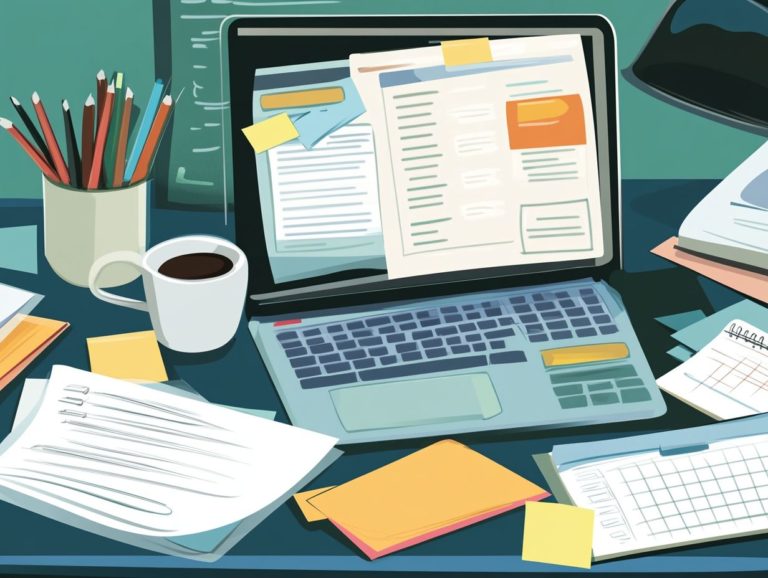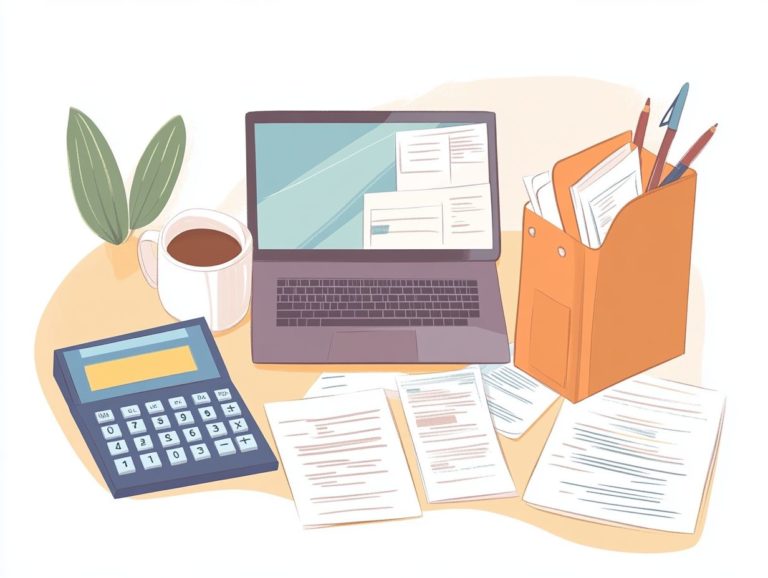How to Track Your Freelance Expenses Efficiently
Managing finances as a freelancer can be overwhelming. However, tracking expenses is vital for your financial health.
This article explains why tracking expenses is important. It also outlines types of expenses to monitor and offers practical tips.
By understanding which work-related costs are deductible (costs you can subtract from your income when calculating taxes), utilizing the right tools, and keeping records organized, you can save money and reduce stress when tax season comes.
This article delves into the importance of expense tracking, the types of expenses to monitor, and practical tips to enhance your financial management. Explore ways to sidestep common pitfalls and maximize your deductions for a more seamless freelance experience.
Contents
- Key Takeaways:
- The Importance of Tracking Freelance Expenses
- Expenses You Should Track
- Tools and Methods for Tracking Expenses
- Organizing and Categorizing Expenses
- Maximizing Tax Deductions
- Avoid These Costly Expense Tracking Mistakes
- Frequently Asked Questions
- 1. Efficiently Track Your Freelance Expenses
- 2. Can I Use a Personal Bank Account to Track My Freelance Expenses?
- 3. Do I Need to Track Every Single Expense for My Freelance Business?
- 4. Recommended Expense Tracking Software or Apps for Freelancers
- 5. How Often Should I Review and Reconcile My Freelance Expenses?
- 6. Can I Claim All My Freelance Expenses as Tax Deductions?
Key Takeaways:
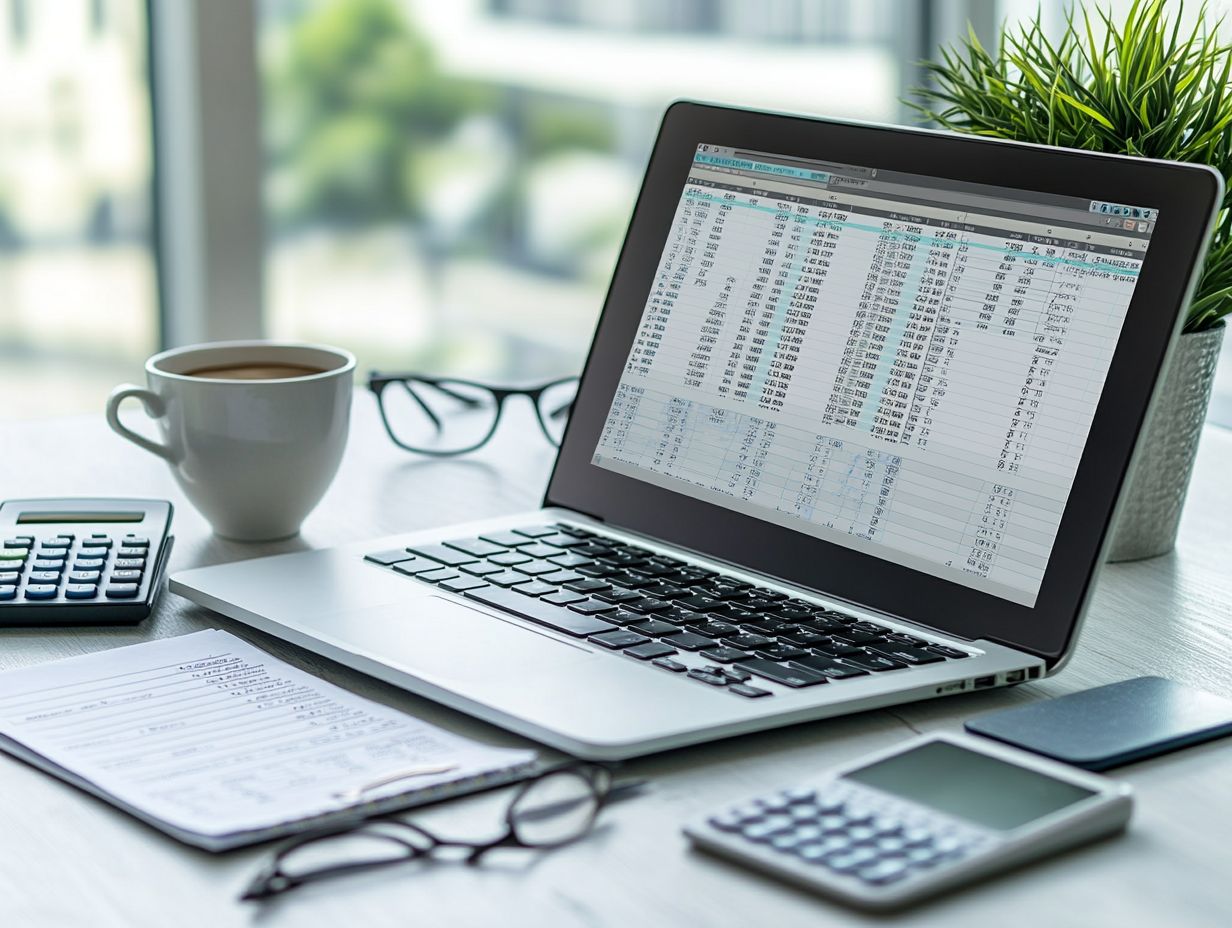
Here are the essential points to remember:
- Track your freelance expenses to ensure you’re prepared for tax time.
- Common work-related costs for freelancers include office supplies, marketing costs, and travel expenses.
- Use digital or manual tools to track expenses; organize and categorize them for efficient management.
- Categorize expenses accurately and review them regularly to maximize tax deductions.
- Avoid common pitfalls in expense tracking like losing receipts and mixing personal and business costs.
The Importance of Tracking Freelance Expenses
Tracking your freelance expenses is essential for effective financial management. It enables you to maintain precise records, control costs, and maximize your tax deductions.
By organizing your work-related costs meticulously, you ensure that you capture every relevant receipt and document, making tax preparation a breeze and enhancing your overall financial health.
With digital tools available, tracking expenses has never been easier or more efficient. This allows you to focus on your professional development without the weight of disorganized finances.
Why Tracking Expenses Matters
Effective financial management is crucial for you as a freelancer to achieve long-term sustainability and growth. Thus, expense tracking is an absolute necessity.
By adopting solid budgeting strategies, you can allocate your resources wisely, ensuring essential expenses are covered while setting aside funds for future investments. Understanding your income statements provides vital insights into your revenue flows, enabling informed decisions that align with your financial goals.
Utilizing expense tracking tools enhances this process by giving you real-time data on your spending habits. This helps pinpoint areas where you can save. A comprehensive approach offers a clearer view of your financial landscape and gives you the power to make proactive adjustments, ultimately leading to a healthier financial future.
Expenses You Should Track
As a freelancer, you encounter various work-related costs that require careful identification and tracking. This management of your costs is crucial for effective expense oversight and seamless tax preparation.
Common Work-Related Costs for Freelancers
Freelancers often face common work-related costs, including office supplies, professional development, and travel costs. These can significantly impact your financial well-being.
Additionally, expenses like software subscriptions, marketing, and insurance can accumulate rapidly. Many freelancers rely on various digital tools for project management and website hosting, contributing to the overall financial picture.
To manage these expenditures efficiently, consider using accounting software or simple spreadsheets. It s vital for freelancers to categorize their business costs effectively. Doing so allows you to identify trends and uncover areas where you might trim expenses.
Regularly reviewing your expense reports sharpens your financial awareness and paves the way for more effective budgeting for future projects.
Don’t let confusion about finances hold you back. Start tracking your expenses today for a brighter financial future!
Tools and Methods for Tracking Expenses
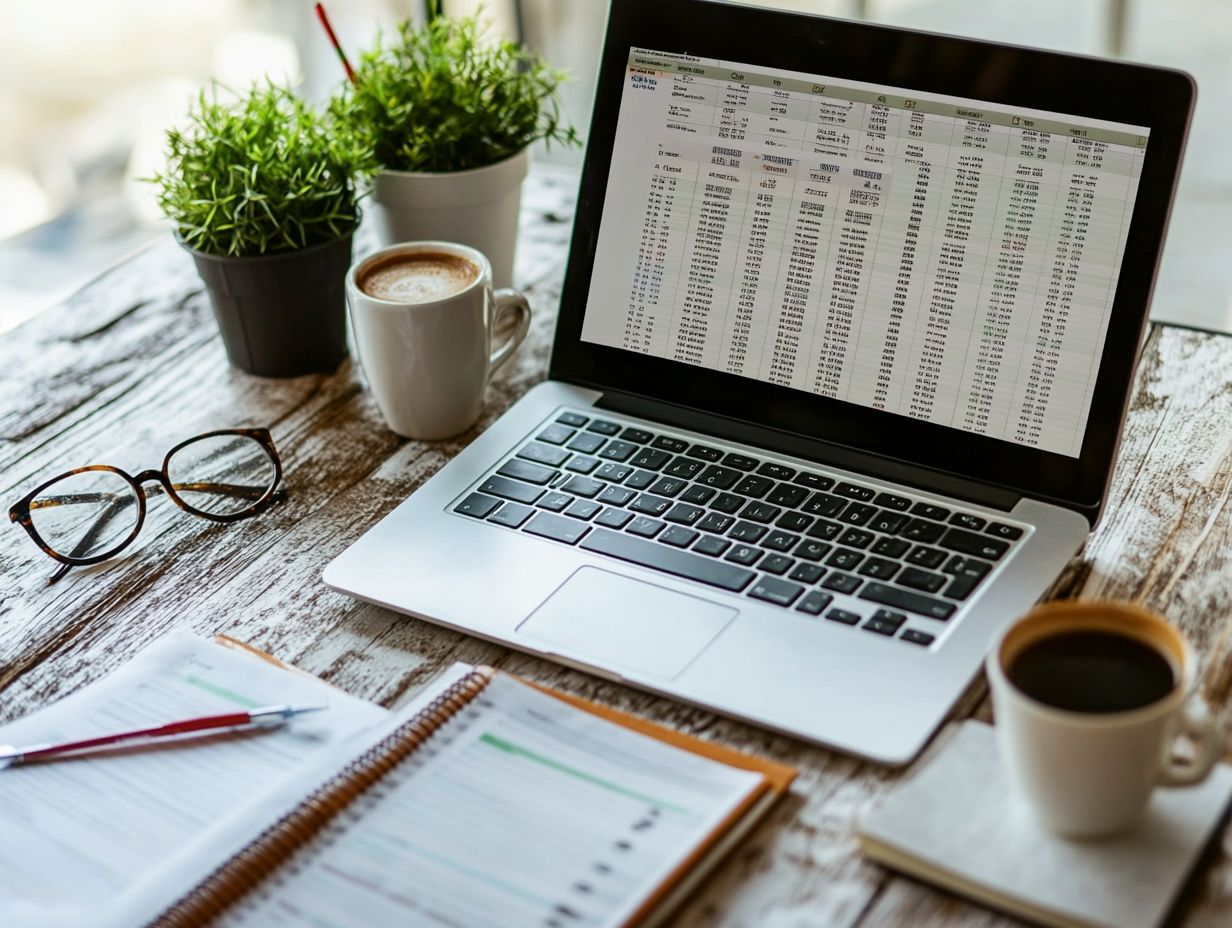
As a freelancer, you possess a diverse array of tools and methods for tracking expenses. Whether you prefer the reliability of traditional paper receipts or the convenience of modern cloud accounting and mobile apps, you can effortlessly streamline your expense management process.
Digital and Manual Options
You can choose between digital and manual options for tracking your expenses. Digital records often offer a more efficient solution through automated entries and mobile apps.
This choice presents its own set of advantages and drawbacks. Digital tools streamline the process, ensuring that your receipts and transactions are organized in one place. This makes it easier to retrieve information when you need it.
Real-time insights give you the power to monitor your financial health, plan budgets, and make informed decisions on the fly.
However, it s essential to acknowledge that traditional manual methods still have their merits. If you prefer a more hands-on approach or lack access to technology, these methods can serve as a reliable backup.
They safeguard your records during technical mishaps and bridge the gap between modern convenience and time-tested practices.
Organizing and Categorizing Expenses
Organizing and categorizing your expenses is essential for efficient expense management. It plays a crucial role in enhancing your financial health and ensuring clarity in your financial records as a freelancer.
Tips for Efficient Expense Management
To manage your expenses efficiently, adopt organized systems for budgeting, cost control, and safeguarding your financial documents.
By implementing effective budgeting techniques, you can track your income and expenditures more accurately. This provides a clearer picture of your financial health.
Using tools that automatically sort your expenses can streamline this process even further, saving you valuable time and minimizing the chance of errors.
Data security is very important; protecting your sensitive financial information should always be a top priority. Employing these strategies can elevate your expense management practices, leading to more informed financial decisions and a greater sense of peace of mind.
Maximizing Tax Deductions
Maximizing tax deductions is essential for freelancers. By knowing which expenses are deductible, you can effectively lower your taxable income while ensuring compliance with IRS regulations.
This knowledge not only safeguards your finances but also gives you the power to take full advantage of the benefits available to you.
Expenses that Can Be Deducted on Taxes
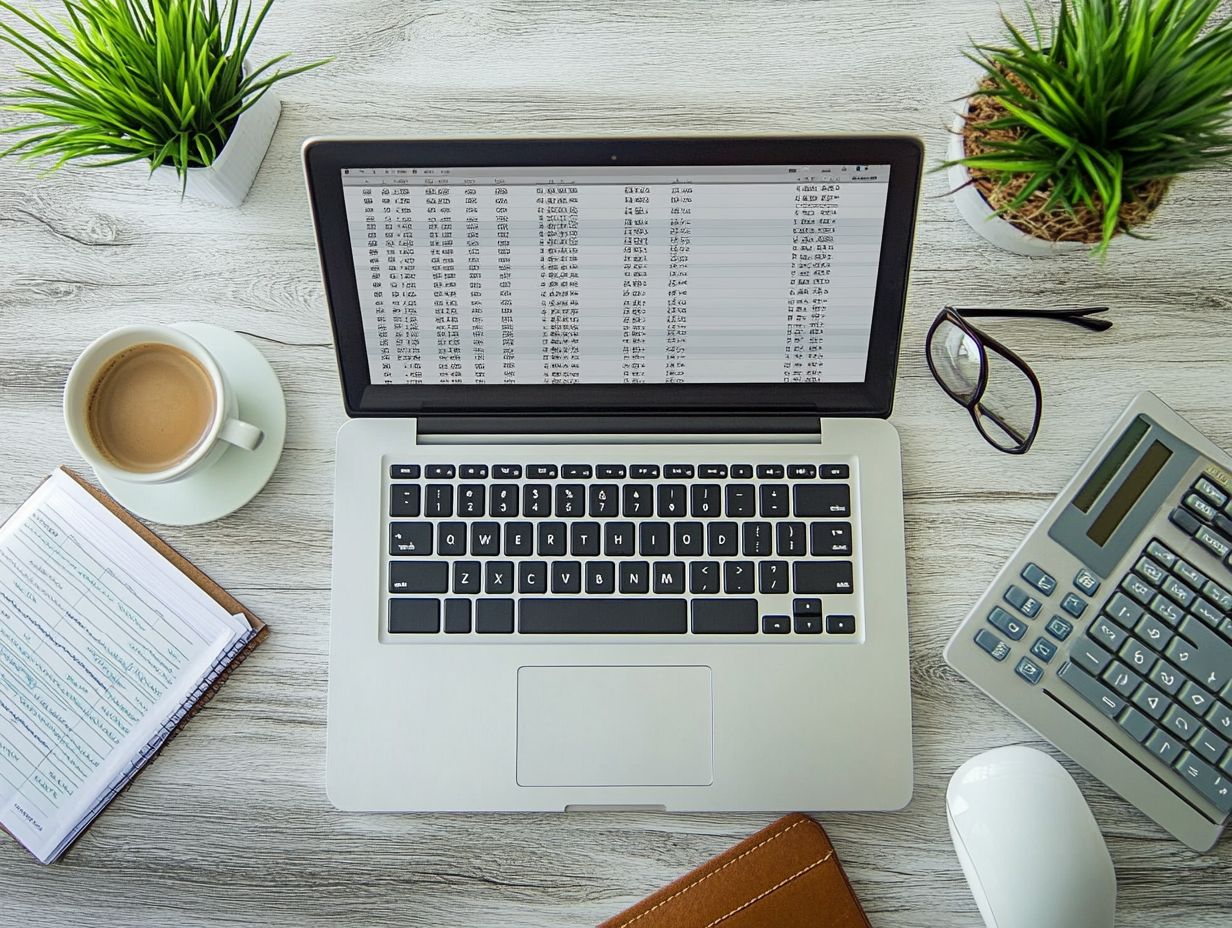
As a freelancer, you can deduct a variety of expenses from your taxable income. This includes costs associated with your business financial account and self-employment tax, ultimately boosting your overall profitability.
Beyond these deductions, you can also claim ordinary expenses like office supplies, software subscriptions, and even a portion of your home utilities if you’ve designated a space for work.
Travel expenses for client meetings or conferences are also deductible, further lightening your tax load.
By understanding and diligently tracking these expenses, you can significantly lower your taxable income, leading to more favorable outcomes during tax preparation.
Keep your records sharp to avoid any surprises! Consider consulting a tax professional to navigate the complexities of regulations and ensure you take full advantage of all available deductions.
Avoid These Costly Expense Tracking Mistakes
Don’t overlook common mistakes in expense tracking; they can cost you big! These errors can put your financial records at risk and make tax preparation a complex and stressful process.
Taking the time to track your expenses accurately can save you from potential headaches down the road.
Start tracking your expenses today to maximize your deductions!
Pitfalls to Watch Out for in Expense Tracking
Several pitfalls can obstruct effective expense tracking as a freelancer. These include poor bookkeeping practices and disorganized documentation. These issues can ultimately impact your financial health.
As you juggle multiple projects, it s easy to fall into a rhythm of irregular tracking. This complicates tax preparation and opens the door to potential money loss. If you fail to categorize your expenses properly, you risk missing out on valuable deductions and misunderstanding your true financial situation.
Neglecting to back up your digital records increases the risk of losing important information, making it difficult to retrieve data when you need it most.
By avoiding these common mistakes, you can take charge of your finances and pave the way to long-term stability!
Frequently Asked Questions
1. Efficiently Track Your Freelance Expenses
Here are some steps to efficiently track your freelance expenses:
- Set up a separate business account for your freelance income and expenses.
- Keep all your receipts and invoices organized in a designated folder or digitally.
- Use accounting software or expense tracking apps to automate the process.
- Categorize your business expenses to easily identify and analyze them.
- Regularly review and reconcile your expenses to ensure accuracy.
- Seek professional help from an accountant or bookkeeper if needed.
2. Can I Use a Personal Bank Account to Track My Freelance Expenses?

While it is not recommended, you can use a personal bank account to track your freelance expenses. However, it may be harder to differentiate between personal and business expenses, which can lead to inaccurate tracking and potential tax issues. It is best to have a separate account to keep your finances organized and avoid any confusion.
3. Do I Need to Track Every Single Expense for My Freelance Business?
Yes, it is important to track all your freelance expenses, regardless of the amount. Even small expenses can add up over time, and tracking them can help you identify areas where you can cut costs or claim deductions during tax season. It also helps with budgeting and managing your overall financial health as a freelancer.
4. Recommended Expense Tracking Software or Apps for Freelancers
There are many expense tracking software and apps available for freelancers, such as QuickBooks Self-Employed, FreshBooks, and Expensify. These tools offer features like automatic bank account syncing, receipt scanning, and categorization to make tracking expenses more efficient and accurate.
5. How Often Should I Review and Reconcile My Freelance Expenses?
It is recommended to review and reconcile your freelance expenses at least once a month. This will ensure that all your records are up to date and accurate, and you can catch any errors or discrepancies early on. It also helps with budgeting and forecasting for the future.
6. Can I Claim All My Freelance Expenses as Tax Deductions?
No, you can only claim legitimate business expenses as tax deductions for your freelance business. This includes expenses directly related to your business, such as office supplies, equipment, and travel expenses. It is important to keep accurate records and consult with a tax professional to determine which expenses are eligible for tax deductions.
Start tracking your expenses today to unlock your financial potential!



